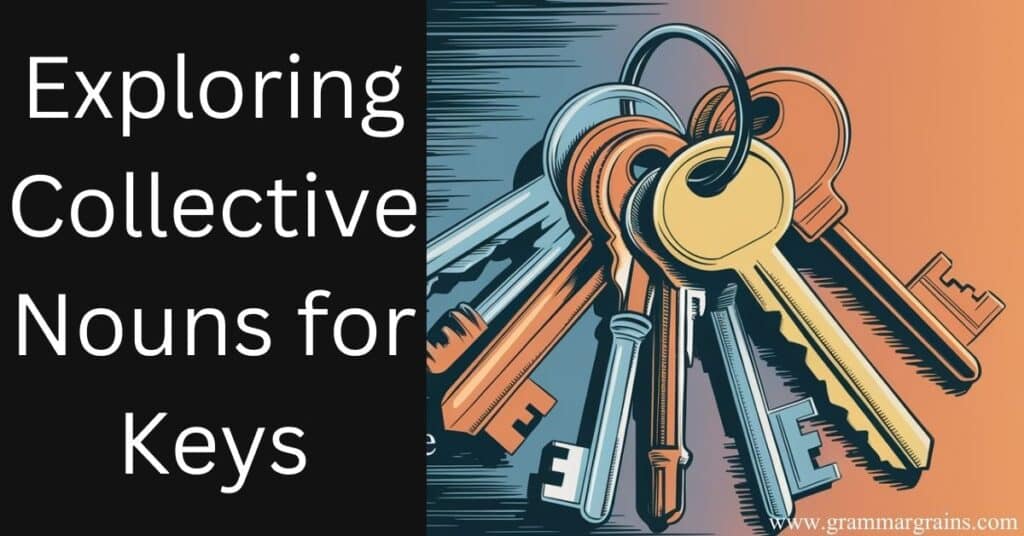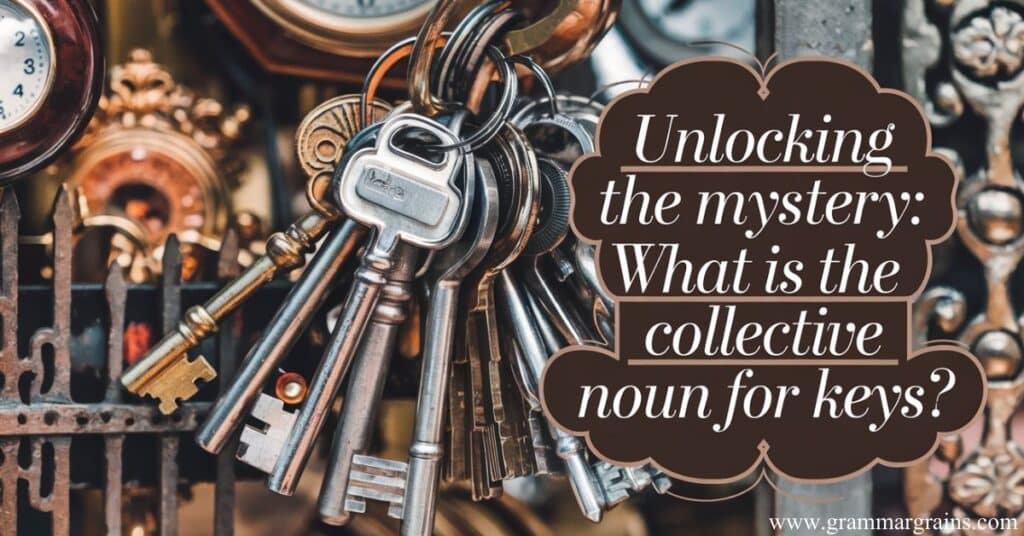Keys are essential in our daily lives, acting as guardians of our homes, cars, and even memories. But what if you find yourself with more than one key in hand?
You may not think about it often, but the English language has a fascinating way of grouping things together with collective nouns. What’s the collective noun for keys? Surprisingly, it’s not as straightforward as you’d expect.
Why Do We Use Collective Nouns?
The English language relies on collective nouns to group things together.
These words make descriptions more vivid and precise.
Instead of saying, “a lot of keys,” you can say a bunch of keys, which is far more descriptive.
Collective nouns also help to clarify context. Whether you’re talking about a key ring, a set of keys, or a cluster of keys, the noun you use paints a clear picture. These group descriptors simplify communication and make it more engaging.
Exploring Collective Nouns for Keys

The variety of collective nouns for keys is fascinating. Each term evokes its own unique imagery.
For instance, a ring of keys suggests order and organization.
On the other hand, a bunch of keys feels more casual, like keys gathered together quickly.
Language reflects how we interact with the world.
Keys symbolism often ties into concepts like control or hidden places.
The choice of a collective noun can even highlight these deeper meanings.
Common Collective Nouns

Bunch of Keys: The Most Common Term
The phrase bunch of keys is used the most.
It describes a casual grouping, often tied together by a simple loop or a keychain.
For example: “She grabbed a bunch of keys and hurried out.”
Ring of Keys: When They’re All Connected
A ring of keys describes keys held together on a metal loop or key ring.
This is common for office access or organizing a key collection.
An example would be: “The ring of keys jingled in her pocket.”
Set of Keys: A Complete Collection
The phrase set of keys implies an organized collection meant for specific locks.
For example, a new hire might receive a set of keys to the building.
It’s a practical term that highlights purpose.
Cluster of Keys: Tightly Grouped
A cluster of keys describes keys bunched tightly together.
This term is less common but effective in certain contexts.
Imagine someone holding a cluster of keys at a historic city’s museum.
Bundle of Keys: A Handy Term for Grouped Keys
A bundle of keys refers to keys tied together, often for safekeeping.
For example: “The locksmith handed over a bundle of keys for the vaults.”
This phrase emphasizes utility and simplicity.
Array of Keys: An Impressive Display
An array of keys describes a wide assortment, often displayed in a museum or locksmith’s shop.
For instance: “The array of keys showcased their intricate designs and history.”
Lesser-Known and Creative Terms
While terms like bunch of keys and ring of keys are common, other phrases can capture attention.
A string of keys could describe keys tied on a cord, while a jingle of keys highlights their sound.
These terms add color and creativity to everyday language.
Even a single word can spark imagery.
For example, “A key collection reveals much about its owner’s history,” or “A locksmith worked through the key groupings with precision.”
These choices enrich descriptions.
Practical Applications of Collective Nouns
Choosing the right term depends on context.
For example, a set of keys is best for formal situations like an office handover, while a bunch of keys suits casual conversations.
Understanding the differences ensures precision.
Here is a useful table:
| Collective Noun | Context/Usage | Example Sentence |
|---|---|---|
| Bunch of Keys | Casual everyday use | “He grabbed a bunch of keys from the counter.” |
| Set of Keys | Organized and specific | “She handed me a set of keys for the locks.” |
| Ring of Keys | Keys on a ring or keychain | “The ring of keys was heavy in his hand.” |
| Bundle of Keys | Tied together for convenience | “A bundle of keys was left at the front desk.” |
| Cluster of Keys | Tightly packed group | “A cluster of keys was discovered in the bag.” |
| Array of Keys | Decorative or impressive display | “The locksmith showed an array of keys.” |
Cultural and Symbolic Perspectives

Keys in Language and Culture
Keys symbolism is rich in meaning.
In ancient cultures, keys represented authority and trust. In modern times, they often symbolize access and new beginnings.
Whether used in a historic city or a modern office, keys hold cultural weight.
The Symbolism of Keys: What Do They Represent?
Keys also appear in art and literature, often signifying freedom or secrets.
In a story, a key ring might unlock hidden places or valuable treasures.
In real life, they remain practical yet powerful symbols of control.
Language Enrichment Activities
Understanding collective nouns is an important part of mastering the English language.
Exercises like identifying a bunch of keys or arranging an array of keys can help sharpen skills.
For fun, try making up your own terms. Could a “gleam of keys” work for polished keys in a museum?
Unlocking the Power of Language

Collective nouns make our language more precise and engaging.
Whether you’re talking about a bunch of keys, a ring of keys, or even a jingle of keys, the right term brings the scene to life.
Think about the next time you grab your key ring or a set of keys. What story does it tell?
Collective nouns add a unique layer of charm and precision to our language, helping us describe groups of objects in vivid and memorable ways.
When it comes to keys, terms like bunch of keys, ring of keys, set of keys, and cluster of keys not only serve practical communication needs but also offer glimpses into cultural, symbolic, and linguistic practices. These expressions reflect how we organize, perceive, and interact with everyday items, often carrying meanings far beyond their surface definitions.
Conclusion
Understanding the context and purpose behind each term enhances our appreciation of language’s flexibility.
Whether you’re describing the jingling ring of keys in your pocket, a tightly grouped bundle of keys, or a meticulously arranged set of keys, the choice of words can influence how your message is understood. By exploring the origins, cultural ties, and practical applications of these collective nouns, we gain insight into the richness of the English language.
Ultimately, language is about connection and creativity. The next time you grab your keys, think about the story they tell.
Are they part of a cherished key collection or symbols of opportunity and security? Whatever the case, these collective nouns unlock not just doors, but the potential to see ordinary objects in extraordinary ways.
FAQs
Q: Is it a chain of keys or a bunch of keys?
A: Both can be correct. A chain of keys describes keys on a string or chain, while a bunch of keys is a more casual term for any group.
Q: What are 10 collective nouns?
Here are some examples: a herd of cows, a pack of wolves, a flock of birds, a school of fish, a cluster of keys, a ring of keys, a bunch of grapes, a bundle of sticks, an array of stars, and a group of people.
Language is all about painting vivid pictures. A simple keychain or ring of keys can unlock so much more than a door—it can unlock the richness of our imagination!

Taila Lucy, an expert content writer at Grammar Grains, brings 4 years of experience crafting engaging pieces on grammar. Her work delves into synonyms, antonyms, slang, puns, and poetry, helping readers master English with creativity and flair.






